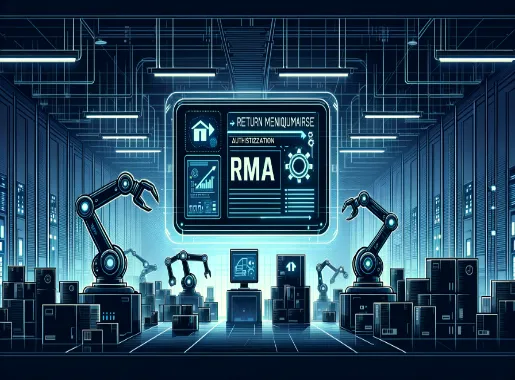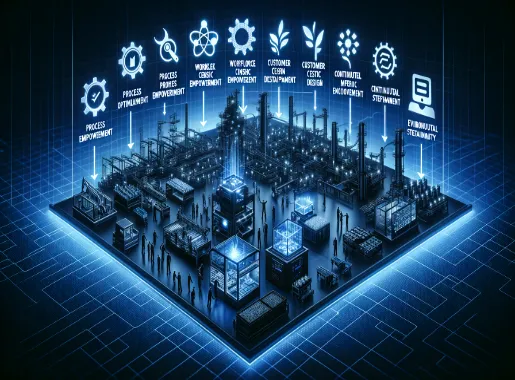Continuous Flow Manufacturing - Key Considerations
Continuous Flow Manufacturing (CFM) represents a paradigm shift in the production industry, focusing on streamlining the movement of materials through various processing stages. It revolutionizes how products come to life, ensuring a seamless journey from raw materials to finished goods. It's all about keeping things moving, cutting idle time, and streamlining processes to boost efficiency and slash production times. This approach is a game-changer for industries with steady demand, enabling them to deliver quality products faster and more reliably. Reducing waste and enhancing productivity supports sustainable practices and sharpens a company's competitive edge. Embracing this method means embracing a future where manufacturing meets the demands of a fast-paced world with grace and agility.
Challenges of Implementing CFM
Implementing Continuous Flow Manufacturing (CFM) is like steering a supertanker through a narrow canal. It's a transformative process that promises efficiency and sustainability, but navigating its complexities requires skill, foresight, and adaptability. One of the primary hurdles companies encounter is achieving seamless supplier coordination. The CFM model thrives on consistency and punctuality; any hiccup in the supply chain can ripple through the production process, creating delays and bottlenecks. Therefore, fostering robust partnerships and communication channels with suppliers becomes crucial.
Moreover, transitioning to a CFM system often necessitates significant layout changes
within production facilities. This isn't just about moving equipment around; it's about
reimagining the flow of materials to minimize downtime and eliminate waste. Such
alterations can be costly and disruptive in the short term, challenging businesses to
maintain operations while transforming their production landscape.
Each challenge requires careful consideration and strategic planning. Businesses
embarking on this transformative journey often encounter obstacles such as:
Seamless Supplier Coordination:
- Issue: Ensuring timely and consistent delivery of materials is crucial in CFM. Any disruption can lead to significant delays.
- Strategy: Develop strong communication channels and partnerships with suppliers to mitigate risks as Mexico’s top production companies do.
Layout Changes within Production Facilities:
- Issue: CFM necessitates a reevaluation of the production layout to optimize the flow of materials.
- Strategy: Plan and execute layout changes carefully to minimize downtime and maintain productivity during the transition.
Cultural Shifts Towards Continuous Improvement:
- Issue: Moving from traditional batch processing to CFM requires a cultural transformation among employees.
- Strategy: Foster a culture of continuous improvement through training, leadership, and incentivizing engagement with new processes.
Addressing the Challenges of Implementing CFM
Addressing these challenges requires a multifaceted approach:
- Build resilience in supply chain relationships to ensure reliability and adaptability in material delivery.
- Invest in intelligent planning and simulation tools to visualize and implement efficient layout changes with minimal operational disruption.
- Cultivate a supportive environment where continuous learning and adaptability are encouraged and rewarded.
Navigating these complexities with a strategic, inclusive approach can smooth the transition to CFM, unlocking its full potential to elevate manufacturing efficiency and sustainability. Manufacturers in Mexico know how to combat these challenges effectively.
Benefits of CFM in a Mexican Manufacturing Context
Adopting Continuous Flow Manufacturing (CFM) presents unique advantages that can significantly enhance operational efficiency and market responsiveness. Mexico's strategic location and burgeoning manufacturing sector make it an ideal hub for companies looking to streamline their production processes like the major industries in Mexico. Here's how CFM can turn the tide in favor of businesses outsourcing to Mexico:
Reduced Transportation Costs:
With its proximity to the US market, companies operating in Mexico can benefit from shorter supply lines and lower transportation costs. CFM further optimizes this advantage by ensuring a steady flow of materials and finished products, minimizing delays and inventory costs.
Enhanced Market Responsiveness:
The agility afforded by CFM allows companies to adapt to market changes and consumer demands quickly. In the fast-paced North American market, this responsiveness can be a game-changer, enabling businesses to outpace competitors and meet customer needs with unprecedented speed.
Streamlined Operations:
The principles of CFM, when applied within Mexico's manufacturing framework, facilitate the elimination of waste and inefficiencies, leading to leaner, more productive operations. This is particularly beneficial in a competitive outsourcing environment where operational excellence can significantly impact profitability.
The transition to Continuous Flow Manufacturing in Mexico offers a compelling proposition for businesses aiming to optimize their production processes. With the proper support and strategies, companies can harness the full potential of CFM, turning operational efficiency into a significant competitive advantage.
Critical Considerations for Implementing CFM in Mexico
Implementing Continuous Flow Manufacturing (CFM) in Mexico requires attention to several critical areas to ensure a seamless transition and optimal performance. Here's a concise overview of these essential considerations:
Supplier Selection and Management:
Identifying and managing suppliers is pivotal in Mexico's diverse manufacturing environment. The right partners must deliver high-quality materials timely and flexibly, allowing businesses to maintain a steady production flow. Effective supplier management ensures a robust supply chain, which is vital for the success of CFM.
Production Line Layout and Optimization:
Crafting a production line that supports a continuous flow is crucial. The layout should minimize transit times, eliminate waste, and avoid bottlenecks. Optimizing the production line boosts efficiency and maximizes the manufacturing space, aligning with CFM principles.
Inventory Management:
CFM emphasizes minimizing inventory to what's essential for maintaining production flow. Managing inventory levels efficiently reduces storage costs and supports the lean manufacturing objectives of CFM, improving operational effectiveness.
Employee Training and Cultural Considerations:
The shift to CFM in Mexico isn't just about adopting new processes; it's about cultural change within the organization. Training employees in CFM practices and cultivating a culture of continuous improvement are essential. A well-trained, adaptable workforce is crucial for thriving in a CFM-driven manufacturing environment.
Focusing on these considerations helps businesses successfully integrate CFM practices, enhancing their manufacturing efficiency and responsiveness in Mexico's competitive landscape.
Partner With Amrep Today!
Adopting Continuous Flow Manufacturing (CFM) with Amrep's expertise in Mexico can revolutionize your production line, ensuring efficiency, reducing costs, and enhancing responsiveness. Our tailored services in supplier quality management, production optimization, and staff training are designed to integrate CFM into your operations seamlessly. Partner with AMREP Mexico for expert guidance and enjoy our Supplier management services.


